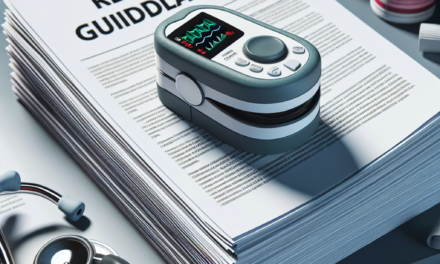Prisma Health Executive Discusses How Rounding Technology Identifies Care Gaps

In the rapidly evolving landscape of healthcare, technology continues to play a pivotal role in enhancing patient care and operational efficiency. One of the most promising advancements in this domain is the use of rounding technology to identify and address care gaps. Prisma Health, a leading healthcare provider, has been at the forefront of integrating this technology into their systems. In this article, we delve into how Prisma Health’s executives are leveraging rounding technology to improve patient outcomes, streamline operations, and ensure comprehensive care delivery.
Understanding Rounding Technology in Healthcare
Rounding technology refers to digital tools and platforms that facilitate the systematic collection and analysis of patient data during routine rounds. These technologies are designed to enhance the traditional rounding process by providing healthcare professionals with real-time access to patient information, enabling them to make informed decisions quickly.
At Prisma Health, rounding technology is integrated into their electronic health records (EHR) system, allowing for seamless data flow and accessibility. This integration ensures that healthcare providers have a comprehensive view of a patient’s medical history, current treatment plans, and any potential care gaps that need to be addressed.
One of the key features of rounding technology is its ability to generate alerts and reminders for healthcare providers. These alerts can be customized based on specific patient needs, ensuring that critical care interventions are not overlooked. For instance, if a patient is due for a particular test or medication, the system will notify the healthcare provider, reducing the risk of missed treatments.
Moreover, rounding technology facilitates better communication among healthcare teams. By providing a centralized platform for data sharing, it ensures that all team members are on the same page regarding a patient’s care plan. This collaborative approach not only improves patient outcomes but also enhances the overall efficiency of healthcare delivery.
The Role of Rounding Technology in Identifying Care Gaps
Care gaps refer to discrepancies between the care a patient receives and the care they should receive based on clinical guidelines and best practices. These gaps can arise due to various reasons, including miscommunication among healthcare providers, lack of access to patient information, or oversight during the care process.
Rounding technology plays a crucial role in identifying these care gaps by providing healthcare providers with real-time data and analytics. By analyzing patient data, the technology can highlight areas where care may be lacking or where additional interventions are needed. This proactive approach ensures that patients receive timely and appropriate care, reducing the risk of adverse outcomes.
For example, if a patient with diabetes is not receiving regular blood sugar monitoring, the rounding technology can flag this as a care gap. Healthcare providers can then take immediate action to address the issue, ensuring that the patient receives the necessary monitoring and treatment.
Furthermore, rounding technology can help identify systemic issues within a healthcare facility that may contribute to care gaps. By analyzing data across multiple patients, the technology can highlight patterns and trends that may indicate underlying problems, such as staffing shortages or inadequate resources. Addressing these systemic issues can lead to significant improvements in patient care and overall healthcare delivery.
Case Studies: Successful Implementation of Rounding Technology at Prisma Health
Prisma Health has been a pioneer in the implementation of rounding technology, and their success stories serve as valuable case studies for other healthcare providers looking to adopt similar systems. These case studies highlight the tangible benefits of rounding technology in improving patient care and operational efficiency.
Case Study 1: Reducing Hospital Readmissions
One of the primary goals of Prisma Health’s rounding technology initiative was to reduce hospital readmissions. By identifying care gaps and ensuring that patients receive comprehensive care during their initial hospital stay, Prisma Health aimed to minimize the need for readmissions.
The implementation of rounding technology led to a significant reduction in readmission rates. By providing healthcare providers with real-time data and alerts, the technology ensured that patients received timely interventions and follow-up care. This proactive approach not only improved patient outcomes but also reduced the financial burden on the healthcare system.
For instance, a study conducted at Prisma Health found that the use of rounding technology reduced readmission rates for heart failure patients by 20%. This reduction was attributed to the technology’s ability to identify care gaps, such as missed medication doses or lack of follow-up appointments, and prompt healthcare providers to take corrective action.
Case Study 2: Enhancing Patient Satisfaction
Patient satisfaction is a critical metric for healthcare providers, as it directly impacts patient retention and reputation. Prisma Health recognized the potential of rounding technology to enhance patient satisfaction by improving communication and care delivery.
By providing healthcare providers with real-time access to patient information, rounding technology enabled more personalized and patient-centered care. Patients reported feeling more informed and involved in their care decisions, leading to higher satisfaction scores.
A survey conducted at Prisma Health revealed that patients who received care facilitated by rounding technology reported a 15% increase in satisfaction compared to those who did not. This increase was attributed to improved communication, timely interventions, and a more personalized approach to care.
Challenges and Solutions in Implementing Rounding Technology
While the benefits of rounding technology are clear, implementing these systems is not without challenges. Healthcare providers must navigate various obstacles to ensure successful integration and utilization of rounding technology.
Challenge 1: Integration with Existing Systems
One of the primary challenges in implementing rounding technology is integrating it with existing EHR systems. Healthcare providers must ensure that the new technology seamlessly integrates with their current systems to avoid disruptions in care delivery.
Prisma Health addressed this challenge by working closely with technology vendors to customize the rounding technology to their specific needs. This collaboration ensured that the technology was compatible with their existing systems and could be easily integrated into their workflows.
Additionally, Prisma Health invested in training programs for their staff to ensure that they were proficient in using the new technology. This training was crucial in minimizing disruptions and ensuring a smooth transition to the new system.
Challenge 2: Data Privacy and Security
Data privacy and security are paramount concerns in healthcare, and the implementation of rounding technology raises questions about the protection of patient information. Healthcare providers must ensure that the technology complies with all relevant regulations and standards to safeguard patient data.
Prisma Health addressed this challenge by implementing robust security measures, such as encryption and access controls, to protect patient data. They also conducted regular audits and assessments to identify and address potential vulnerabilities in their systems.
Furthermore, Prisma Health prioritized transparency and communication with patients regarding the use of their data. By providing clear information about how patient data is collected, used, and protected, they were able to build trust and confidence among their patients.
The Future of Rounding Technology in Healthcare
The successful implementation of rounding technology at Prisma Health highlights its potential to transform healthcare delivery. As technology continues to evolve, the future of rounding technology in healthcare looks promising, with several exciting developments on the horizon.
Advancements in Artificial Intelligence and Machine Learning
Artificial intelligence (AI) and machine learning (ML) are poised to play a significant role in the future of rounding technology. These technologies have the potential to enhance the capabilities of rounding technology by providing more accurate and predictive insights into patient care.
For example, AI algorithms can analyze large volumes of patient data to identify patterns and trends that may indicate potential care gaps. This predictive capability can enable healthcare providers to take proactive measures to address these gaps before they lead to adverse outcomes.
Prisma Health is already exploring the integration of AI and ML into their rounding technology systems. By leveraging these technologies, they aim to further enhance their ability to identify and address care gaps, ultimately improving patient outcomes and operational efficiency.
Expansion to Outpatient and Community Settings
While rounding technology has primarily been used in inpatient settings, there is significant potential for its expansion to outpatient and community settings. By extending the reach of rounding technology, healthcare providers can ensure that patients receive comprehensive care across the continuum of care.
Prisma Health is actively exploring opportunities to expand their rounding technology to outpatient clinics and community health centers. This expansion will enable them to identify and address care gaps in these settings, ensuring that patients receive timely and appropriate care regardless of where they are in their healthcare journey.
By expanding the use of rounding technology to outpatient and community settings, Prisma Health aims to improve care coordination and continuity, ultimately leading to better patient outcomes and satisfaction.
Conclusion: The Transformative Impact of Rounding Technology
Rounding technology has emerged as a powerful tool in the quest to improve patient care and operational efficiency in healthcare. Prisma Health’s successful implementation of this technology serves as a testament to its potential to transform healthcare delivery.
By providing healthcare providers with real-time access to patient data and analytics, rounding technology enables the identification and addressing of care gaps, leading to improved patient outcomes and satisfaction. The integration of AI and ML into rounding technology promises to further enhance its capabilities, providing even more accurate and predictive insights into patient care.
As healthcare providers continue to navigate the challenges of implementing rounding technology, the lessons learned from Prisma Health’s experience can serve as valuable guidance. By prioritizing integration, data privacy, and patient communication, healthcare providers can successfully leverage rounding technology to enhance care delivery and ensure comprehensive care for all patients.
In conclusion, rounding technology represents a significant advancement in healthcare, with the potential to revolutionize the way care is delivered. As technology continues to evolve, the future of rounding technology in healthcare looks bright, promising improved patient outcomes and operational efficiency for healthcare providers worldwide.





